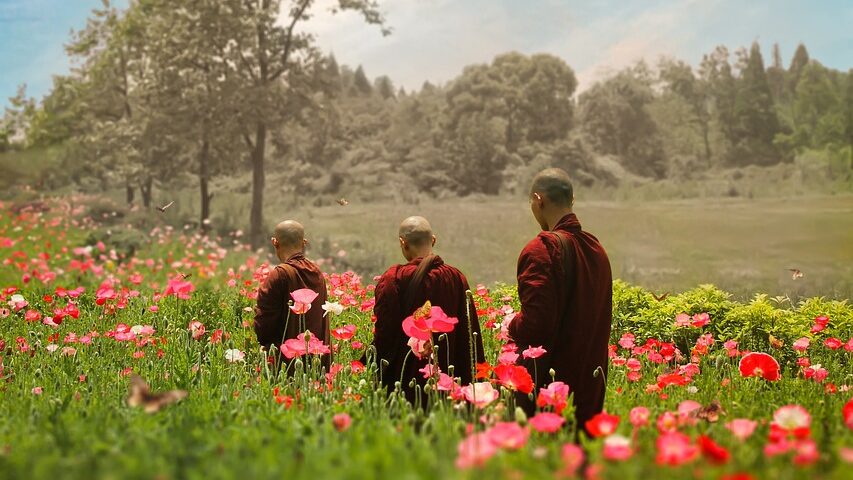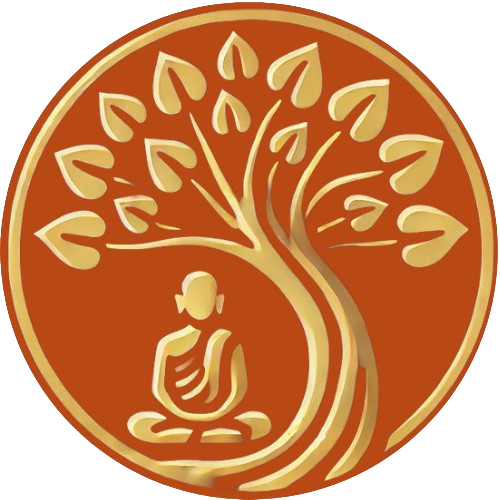The Noble Eightfold Path: The Only Skillful Way to Live

In life, we often seek happiness in ways that bring more stress, confusion, and disappointment. We chase after pleasure, success, and comfort, only to find that they never last. We react to problems with frustration, avoidance, orblame, making things worse. Deep inside, we long for a way of living that brings true peace—a life that is clear, meaningful, and free from unnecessary suffering.
The Buddha, out of infinite wisdom and compassion, showed us that such a life is not only possible but completely natural. He called it the Noble Eightfold Path, the only skillful way of living that leads to lasting happiness.This is not a set of commandments or rigid rules—it is a practical, balanced, and deeply intelligent way to live.
The Eightfold Path is divided into three areas:
- Wisdom (Paññā) – Seeing life clearly and setting the right intentions.
- Ethical Conduct (Sīla) – Living in a way that supports peace and well-being.
- Mental Cultivation (Samādhi) – Developing focus, mindfulness, andinner peace.
Let’s explore each step, not as abstract concepts, but as essential principles that can transform your daily life.
Wisdom: Seeing Life as It Truly Is
The way we see the world shapes how we live in it. If our understanding is clouded by confusion, we make choices that lead to suffering. True wisdom comes from seeing things as they really are.
Right View (Sammā Diṭṭhi) – Understanding Life Correctly
Most of our struggles come from misunderstanding reality. We act as if life is permanent, as if chasing pleasure will bring lasting happiness, and as if external things define our worth. Right View means seeing clearly that everything is impermanent, that suffering comes from attachment, and that freedom comes from letting go.
How this changes your life:
- You stop wasting energy on things that don’t truly matter.
- You no longer expect things to stay the same, reducing disappointment.
- You begin to look inward for happiness, rather than depending onothers.
Right View is the foundation for everything else. Without it, we keep repeating the same mistakes.
Right Intention (Sammā Saṅkappa) – Aligning Your Heart with Wisdom
Once we understand the truth, the next step is setting the right intentions. The Buddha taught three essential intentions:
- The intention of renunciation – Letting go of unhealthy cravings.
- The intention of goodwill – Approaching others with kindness and compassion.
- The intention of harmlessness – Choosing not to harm anyone, in thought, word, or action.
How this changes your life:
- Instead of constantly chasing desires, you find contentment insimplicity.
- Instead of reacting with anger, you respond with understanding.
- Instead of causing harm—whether through words, actions, or even thoughts—you become a source of peace.
With Right Intention, we no longer act out of greed, hatred, or delusion. We begin to live from a place of wisdom and kindness.
Ethical Conduct: Living in Harmony with the World
A peaceful mind cannot exist in a life full of unwholesome actions. Right action, speech, and livelihood create the foundation for a clear conscience and a life free from regret.
Right Speech (Sammā Vācā) – Speaking with Truth and Kindness
Words have power. They can heal or harm, uplift or destroy. Right Speech means speaking in a way that is truthful, kind, and beneficial. It means avoiding:
- Lies – Because falsehoods create confusion and distrust.
- Harsh speech – Because anger only creates more sufering.
- Gossip and idle chatter – Because useless talk wastes time and weakens the mind.
How this changes your life:
- People trust and respect you because you always speak the truth.
- Your words bring peace rather than conflict.
- Your mind becomes clearer, as you avoid unnecessary speech.
When we practice Right Speech, our words become a force for good in the world.
Right Action (Sammā Kammanta) – Acting with Integrity
Our actions shape our life. Right Action means living in a way that avoids harming ourselves or others. The Buddha emphasized three basic principles:
- Do not kill or harm living beings – Cultivate compassion for all life.
- Do not steal or take what is not given – Live with honesty and generosity.
- Do not engage in sexual misconduct – Maintain relationships based on trust and respect.
How this changes your life:
- You no longer create unnecessary conflicts or regrets.
- Your heart feels lighter because you live with integrity.
- Your actions support harmony and well-being in your community.
Right Action is not about strict morality—it is about living in a way that brings peace rather than harm.
Right Livelihood (Sammā Ājīva) – Earning a Living Honestly
Right Livelihood means choosing work that does not harm others. It means avoiding professions that exploit, deceive, or cause sufering (such as dealing in weapons, intoxicants, or dishonesty).
How this changes your life:
- Your income supports your well-being without compromising your values.
- You feel at peace knowing your work benefits others, rather than harming them.
- Your mind is free from guilt and inner conflict.
When we earn a living honestly, we align our external life with our inner values.
Mental Cultivation: Training the Mind for Peace andClarity
A peaceful life comes from a peaceful mind. The last three factors of the path focus on developing mental discipline.
Right Effort (Sammā Vāyāma) – Cultivating WholesomeQualities
Right Efort means making a continuous, joyful effort to improve yourself.It involves four steps:
- Avoiding unwholesome qualities before they arise.
- Abandoning unwholesome qualities when they have arisen.
- Developing wholesome qualities.
- Maintaining and strengthening wholesome qualities.
How this changes your life:
- You stop feeding negative habits and cultivate positive ones.
- Your mind becomes stronger and more disciplined.
- You feel a deep sense of purpose and progress.
Right Efort is the engine that keeps you moving forward on the path.
Right Mindfulness (Sammā Sati) – Being Fully Present
Right Mindfulness means living with full awareness—whether walking, eating, working, or speaking. It means paying attention to thoughts, emotions, andsensations without clinging or resisting.
How this changes your life:
- You become less reactive and more balanced.
- Small moments become sources of joy and insight.
- You stop dwelling in the past or worrying about the future.
Right Mindfulness brings us fully into the present, where life is actually happening.
Right Concentration (Sammā Samādhi) – Training the Mind for Deep Peace
Right Concentration means developing deep focus through meditation. When the mind is scattered, we feel restless and dissatisfied. When the mind isstable, we experience calm, clarity, and joy.
How this changes your life:
- Your mind becomes strong and unshaken by external events.
- You experience deep inner peace and joy.
- You gain profound insights into the nature of reality.
Right Concentration allows us to see reality clearly and free ourselves from suffering.
Living the Eightfold Path: The Only Skillful Way to Live
This path is not just for monks or philosophers—it is the most practical, intelligent, and fulfilling way to live. When we follow it, we:
- Reduce suffering in our own lives.
- Create peace in the world around us.
- Move toward true freedom and awakening.
At Nauyana Monastery, we are dedicated to walking this path together, supporting all who seek wisdom, peace, and liberation. Wherever you are on your journey, may you find joy in practicing the only skillful way of living.




